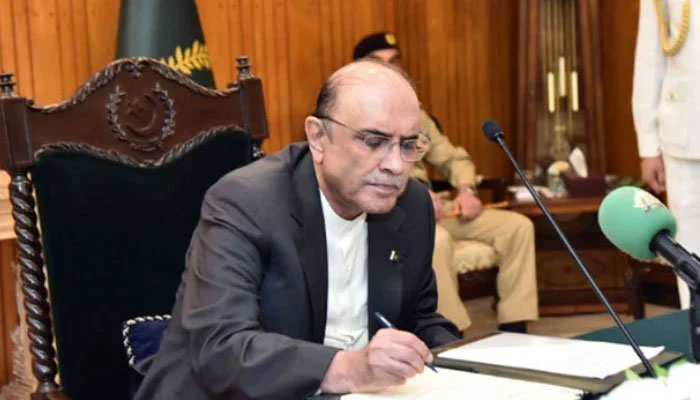President Zardari Signs Madrassa Registration Bill Into Law
ISLAMABAD: After weeks of tension, President Asif Ali Zardari has signed the contentious madrassa registration bill into law, resolving a major dispute between the government and the Jamiat Ulema-e-Islam-Fazl (JUI-F). The bill, which had already passed both houses of Parliament, has now been officially enacted with the issuance of a gazette notification by the National Assembly Secretariat.
Under the new law, madrassas (religious seminaries) will be registered in accordance with the Societies Act. In addition, President Zardari has issued an ordinance introducing amendments to the Societies Registration Act of 2024. These changes apply specifically to Islamabad and give madrassas the option to register either with the education ministry or the industries ministry.
The resolution of this issue came after a meeting between Prime Minister Shehbaz Sharif and JUI-F leader Maulana Fazlur Rehman. Reports indicate that Prime Minister Sharif accepted all demands made by the Ittehad Tanzeemat-e-Madaris Deenia (ITMD), an umbrella group representing religious seminaries, which helped break the deadlock over the bill.
The madrassa bill had become a significant point of contention between the government and the JUI-F. The religious party had conditioned its support for the 26th Amendment on the passing of this bill, which led to an agreement on its final form. However, President Zardari had previously raised several objections, including concerns that the bill could expose Pakistan to international sanctions, particularly from the Financial Action Task Force (FATF) and the European Union’s Generalized Scheme of Preferences (GSP+) status.
President Zardari had also expressed fears that registering madrassas under the Societies Act might lead to sectarian tensions, law and order issues, and misuse of seminaries for purposes other than education. He had warned that such a move could damage Pakistan’s international standing and jeopardize the country’s stability. However, after the government and JUI-F resolved their differences, these concerns were addressed, paving the way for the law’s enactment.
The new law, while addressing the president’s concerns, also aims to ensure that madrassas in Islamabad follow proper registration procedures, with oversight to prevent misuse. The move is seen as a significant step in regulating religious seminaries while balancing the interests of all stakeholders involved.
The signing of the madrassa registration bill is expected to bring greater transparency to the religious education system in Pakistan and resolve a longstanding issue between the government and religious parties. The federal government has expressed its commitment to supporting madrassas in the areas of education, governance, and international compliance.





Comments are closed, but trackbacks and pingbacks are open.